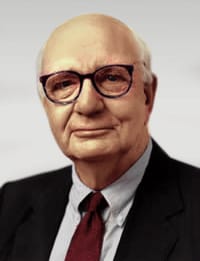Howard Kurz, C’79, founder & CIO of hedge fund Lily Pond Capital Management, would love to debate Paul Volcker Jr. on the bus. The famous economist and former chairman of the Federal Reserve occasionally rides the same public transportation in Manhattan as Kurz. He has not worked up the nerve to approach the 6-foot-7 -octogenarian, but Kurz is itching to engage him on the merits of the so-called “Volcker Rule,” Kurz told an audience of students, faculty and others during a presentation sponsored by the Wharton Public Policy Initiative (PPI).
The Volcker Rule was encoded in law in the Dodd-Frank Wall Street Reform and Consumer Protection Act, and bans proprietary trading at banks. It has essentially caused a bank “brain drain,” in Kurz’s words, with top talent making their way to hedge funds.
Kurz is also eager to debate all comers about Lehman Brothers. Was allowing Lehman Brothers to collapse a stroke of genius by government policymakers and regulators? Or was it the stupidest policy move in the past 50 years?
On one hand, it is healthy to allow “creative destruction” in a free market economy, Kurz said
On the other, the collapse of the bank and resulting seizure in international financial markets has led to the Volcker Rule and other unprecedented policies and actions by the federal government. These have led to decreased transparency in the financial markets, a drop in liquidity and increased correlation across asset classes.

Paul Volcker Jr.
And to boot, possibly for the first time in recent history, investors are questioning the solvency of sovereigns.
It is in this sovereign debt that Kurz (albeit not out on a limb here) foresees the next “chapter” of the debt crisis blowing up.
This is all not to say that Kurz does not believe in sound public policy. He does.
And that is not to say that he is not in awe of what some policymakers are doing now.
“They are absolutely and positively rewriting the book on crisis response,” he said of Ben Bernanke and the Federal Reserve’s quantitative easing and other steps, which Kurz believes will be the grist of economist textbooks for a generation or more.
Yet there is also no precedent for what the Fed’s end game in all this will be. So it is not to say that Kurz sounded all too confident that it will end well, though surely he would debate anyone about that.
Kurz spoke on campus on Feb. 20 as part of the Wharton Public Policy Initiative’s “Economic Crisis & Public Policy” speaking engagement.

























